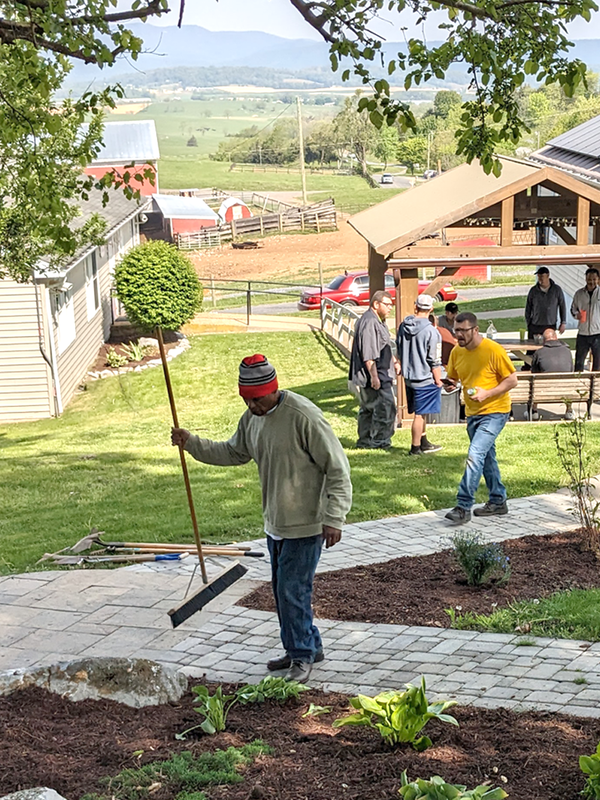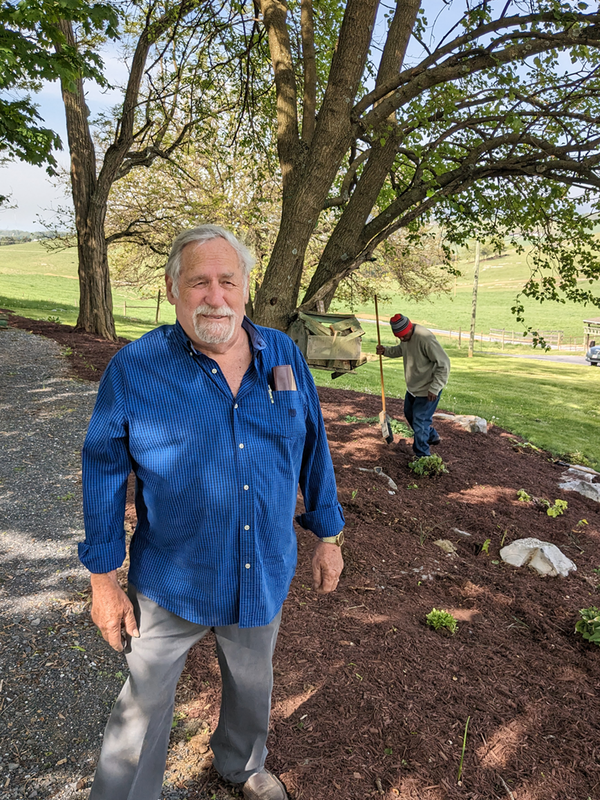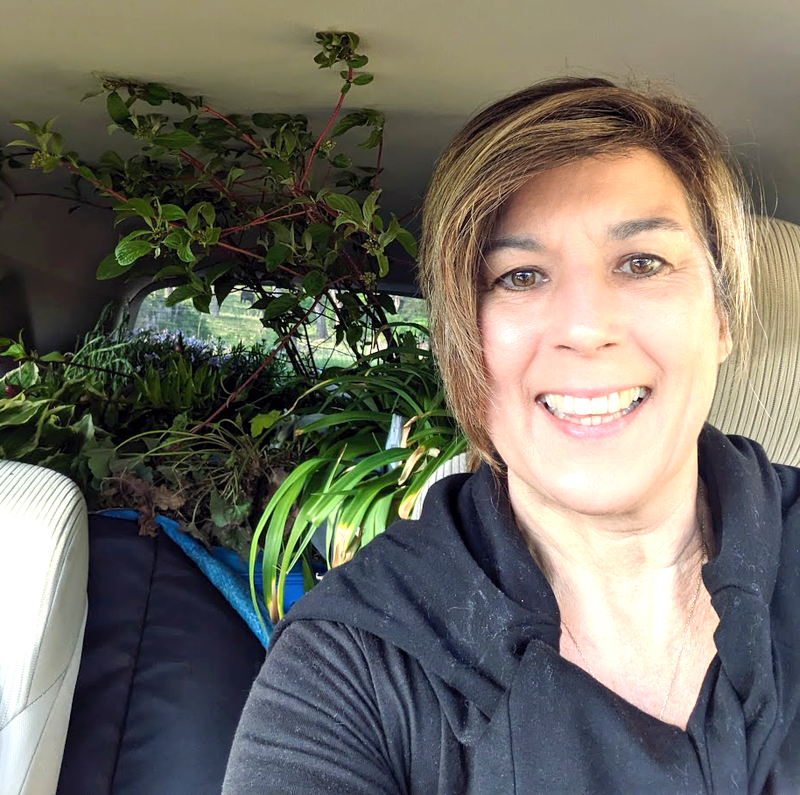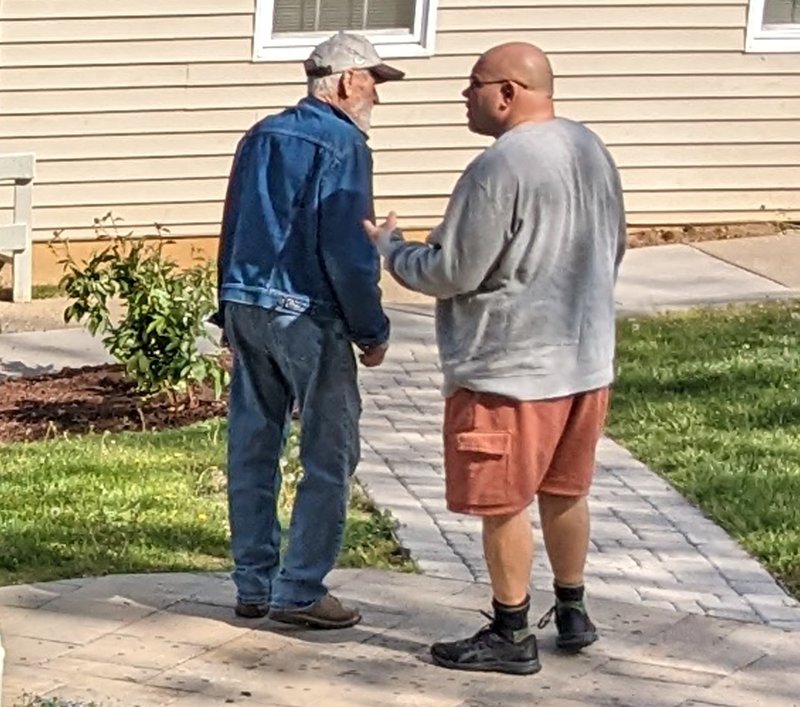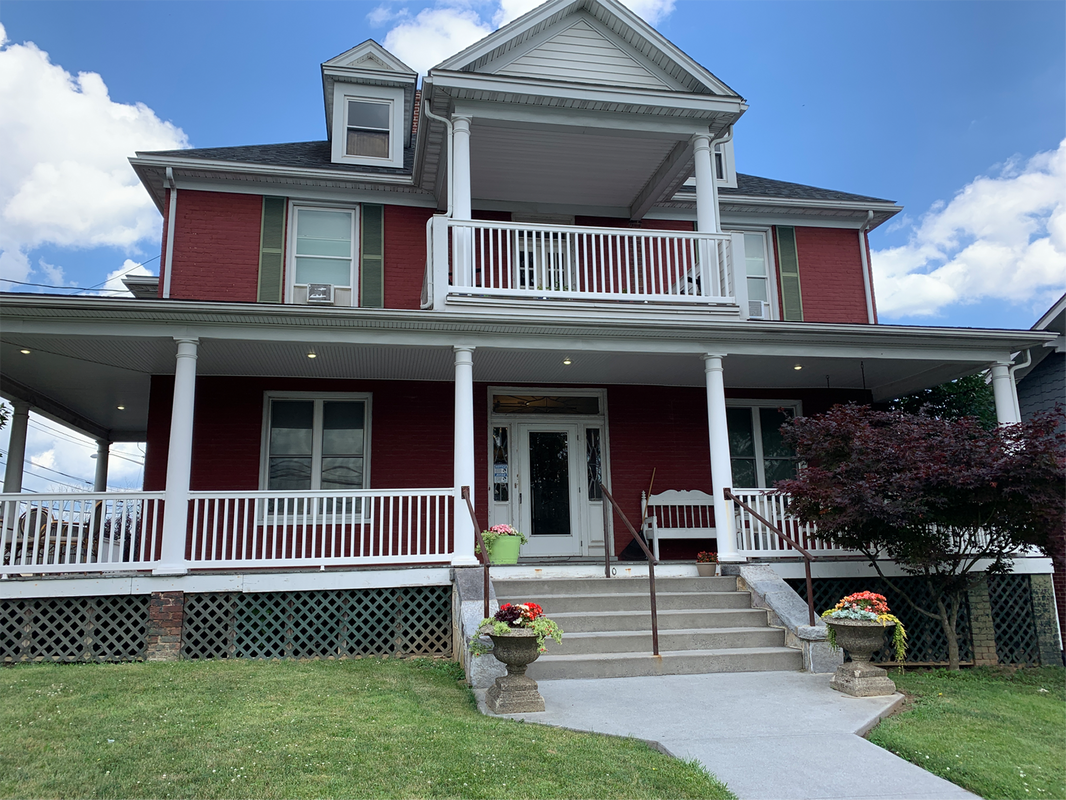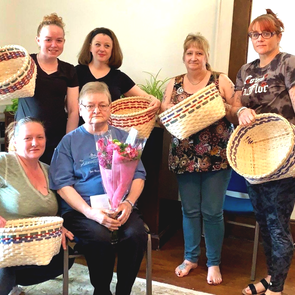|
 Defense Attorney Aaron Cook Defense Attorney Aaron Cook Gemeinschaft Home is proud to announce that Defense Attorney Aaron Cook has been honored with the prestigious Change Agent of the Year Award. This esteemed award celebrates Mr. Cook's exceptional efforts in driving positive change towards social and restorative justice for all in the Shenandoah Valley community. The Change Agent of the Year Award recognizes individuals who embody a deep commitment to promoting equity, fairness, and inclusivity through their professional endeavors, volunteerism, policy advocacy, and community outreach initiatives. Aaron Cook's relentless dedication to advancing the cause of social and restorative justice has made a lasting impact on the lives of many. Mr. Cook will be presented with this esteemed award at the inaugural Agency of Change Event (ACE) on September 22, 2023. ACE is a fundraising gala organized by Gemeinschaft Home, a non-profit organization dedicated to improving the lives of justice-involved individuals through cutting-edge programming. The event aims to raise funds to support Gemeinschaft Home's mission and create awareness about the transformative power of restorative justice. "We are thrilled to honor Aaron Cook as the Change Agent of the Year," said Sharon McAvoy, Executive Director of Gemeinschaft Home. "His unwavering commitment to social and restorative justice has positively impacted our community and inspires others to join the movement. Aaron's dedication and tireless efforts exemplify the values we hold dear at Gemeinschaft Home." As a respected defense attorney in Harrisonburg, Aaron Cook has demonstrated a deep understanding of the challenges faced by justice-involved individuals. His compassionate approach, combined with his legal expertise, has helped countless individuals reconcile their past and build a brighter future. Through his advocacy, Mr. Cook has tirelessly worked to reduce recidivism rates and create pathways for successful reintegration into society. "I am deeply honored to receive the Change Agent of the Year Award," expressed Aaron Cook. "This recognition is a testament to the collective efforts of the community and the incredible work done by Gemeinschaft Home. It is my privilege to be part of a movement that promotes social and restorative justice, and I am grateful for the opportunity to contribute to the positive transformation of lives." The Agency of Change Event promises to be an extraordinary evening, featuring a captivating program that includes a live auction, a mesmerizing performance by award-winning magician Christophe Fox, and a gourmet dining experience. By attending this event, community members can actively contribute to Gemeinschaft Home's mission and create a lasting impact in the lives of justice-involved individuals. For more information about the Agency of Change Event, sponsorship opportunities, and ticket sales, please visit www.GemeinschaftHome.org/events. About Cook Attorneys: Cook Attorneys is a respected law firm based in Harrisonburg, Virginia. Led by Defense Attorney Aaron Cook, the firm is dedicated to providing top-tier legal representation and advocating for the rights of individuals in the criminal justice system. Media Contact: Jennifer Sodikoff Event Consultant Contemplate Marketing Phone: (925) 360-1533 Email: [email protected] Gemeinschaft Home's Newest Case Manager  Case Manager, Aaron Harris Case Manager, Aaron Harris At the end of 2022, Aaron Harris joined the Gemeinschaft Home team as a case manager, working with men enrolled in the residential program on Mt. Clinton Pike. At age 56, Harris brings a range of life experience to the job, which gives him a unique perspective when engaging with program participants. Born in upstate New York, Harris has lived all over the country, from his high school graduation during the mid-1980s in Miami, Florida to time spent on the west coast working in the restaurant industry in the San Francisco Bay area until the late 1990s. Drug and alcohol use is rampant among many restaurant workers, owing to high stress environments and grueling hours, and Harris has struggled over the years with addiction. He returned to upstate New York in the early 2000s to be near his family and to seek help for substance abuse. After participating in a residential program at an ARC (Adult Rehabilitation Center), Harris began to focus on his future, first enrolling in community college courses in 2005 and later graduating with a degree in English and fine arts from Keuka College. Harris says that his experience in the ARC program introduced him to the concept and importance of social work and community-based services for individuals in need, and he started to notice that “there are a lot of people in the world who either were not getting help they need or not enough.” Harris also married and started a family during this period, and eventually relocated to Harrisonburg, Virginia to attend the Master of Fine Arts program at James Madison University. He graduated in 2011 and remained in Virginia but continued to struggle periodically with addiction and eventually enrolled in a six-month residential program (ARC) offered by the he Salvation Army in Virginia Beach. Harris’ experience in this program solidified his desire to pursue a career in human services, and he was hired by the Salvation Army to work for the program after he successfully completed it. He spent several years working for the organization, starting out at the front desk, but later moving into positions of higher responsibility, which includes becoming a house manager and most recently the intake coordinator. Because his family lives in Harrisonburg, Harris returned to the area to pursue his current position at Gemeinschaft Home and to be near his children. As case manager, he draws from his own life experiences to engage with current participants and to offer a path forward without judgement. Harris’ philosophy is “Yeah, I have been there, but look at me now, I am proof that you can do it,” adding “We are not defined by our past. We are who we are now.” He says the job brings many challenges but argues that “as long as you come in with a good level of sincerity,” success is possible. 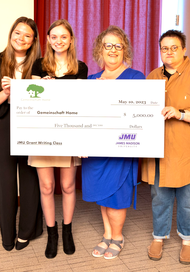 Kaitlyn Johnson, Samantha Dean, Sharon McAvoy, and Jennifer Jacovitch Kaitlyn Johnson, Samantha Dean, Sharon McAvoy, and Jennifer Jacovitch During a ceremony on May 10, Gemeinschaft Home was one of two organizations awarded a $5,000 grant by undergraduate students at James Madison University. Under the guidance of Dr. Terry Fernsler, an adjunct professor in the Department of Social Work, students taking his Spring 2023 course in Grant writing for Agencies offered a call for proposals aimed at local area nonprofits to support their missions. Each participating nonprofit submitted a project idea and was then paired with students in the class to write a grant proposal to be judged and awarded by a committee of classmates. Working with Gemeinschaft Home’s grant writer, Jennifer Jacovitch, juniors Kaitlyn Johnson and Samantha Dean, crafted a project that would establish a paid student internship position at Gemeinschaft Home who would facilitate a JMU-student-based volunteer and/or fundraising project for the organization. The project was awarded the grant along with the other winning grant project submitted by Skyline Literacy. Gemeinschaft Home’s Veggie Garden  Gemeinschaft Home Vegetable Boxes Gemeinschaft Home Vegetable Boxes In the spring of 2022, a group of student volunteers from James Madison University constructed a small number of 18in x 36in boxes for planting vegetables. Coordinated by Jenna Piersol, from JMU’s Community Service-Learning unit, the students placed the boxes on stands located on the west-side porch at the men’s residence on Mt. Clinton Pike. This spring, another group of students re-planted the boxes with a variety of vegetables, lettuces, and herbs that are used for cooking in the house. The vegetable garden provides another way for residents to learn about healthy living practices, and there are plans to construct vegetable boxes for the women’s residence soon. Gemeinschaft Home’s garden sees major improvements this spring. 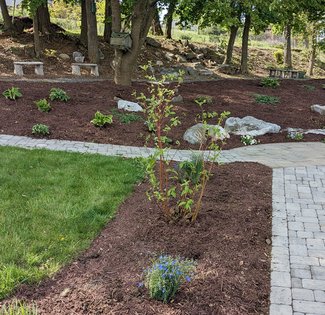 Gemeinschaft Home Therapy Garden Gemeinschaft Home Therapy Garden The 2020 Vision for the Future fundraising campaign established a therapy garden at Gemeinschaft Home, which was constructed during the fall of 2021, offering a peaceful space for program residents to enjoy nature in their own backyard. Lined with paved and natural paths, benches, and variety of plant life, the Gemeinschaft serenity garden includes a view of the Alleghany mountains and surrounding farmland. In May, thanks to the efforts of Kim and David Cassford of Shenandoah, the garden received some updates, including eight new hazelnut seedlings (donated by Burgundy Orchards, LLC), and a range of plants, shrubs, and grasses suited for different seasons and sunlight requirements. Among them are irises, peonies, ferns, cone flowers, and hollyhocks. Cassford was inspired to enhance the garden after she visited Gemeinschaft Home’s property on Mt. Clinton Pike for the first time in April. She affirms that serenity gardens provide “a safe place that passes no judgement, a passive engagement activity that supports wellbeing and mental health, an automatic stress reducer, a place to quiet the mind, and enjoy the beauty of nature and its habitat.” Kim Cassford worked on the garden at Gemeinschaft Home on three separate days, accompanied on various visits by her husband David, and her long-time friend, Alan Harpine. At 94 years of age, Harpine is very involved in the community, managing a private vegetable garden, where he donates all the food to local individuals. Cassford was assisted by Gemeinschaft residents and staff member Russell Smith, to decide where to plant each new item. Her neighbor, Quinton Garber, also donated birdhouses constructed from upcycled materials, to draw more birdlife to the garden. Most of all, Cassford stresses the importance of “the dialogue and the conversation that came from being in the garden and the positive experience it gave the residents to have fun, enjoy, and just be.” Cassford intends to keep working on the garden this summer, a remarkable contribution of both labor and materials that makes the experience of living and recovering at Gemeinschaft Home better for program participants. Note: Kim Cassford is the Director of Resource Development at the Shenandoah Community Foundation and Co-Founder of Cassford Management LLC. Gemeinschaft Home is one of only 30 local organizations across the country selected to participate in the 2022 Catalyst Grant Program to use data and technology to advance racial equity in the criminal legal system in prevention, policing, and prosecution. The program, spearheaded by the Urban Institute and the Microsoft Justice Reform Initiative, seeks to build the capacity of community organizations to use technology to analyze, visualize, and share data to support community organizing, advocacy, and service provision. Each grantee will receive funds to cover project implementation; assistance on data, policy, and community engagement from the Urban Institute; access to Microsoft technology and related support; and peer learning opportunities. Gemeinschaft Home is using the funds to work with Frederick Teye, Amanda Teye, Ph.D., and Jennifer Jacovitch, Ph.D., of the Applied Research and Evaluation Technologies (ARET) Group, a Harrisonburg-based software development collaborative, to create a customized, case management platform that will enable Gemeinschaft Home staff to securely collect, analyze, and report information about participants and program performance with community stakeholders. The ARET Group will also develop extensive user documentation and instructions and train all staff members in using the new software system. The system (named “RESTART”) will provide a mechanism to systematically store and analyze data that can be used to track information—anonymously— about program participants and their experiences, for the purpose of improving program design and implementation, as well as participant outcomes, both at the organization and local policy levels. More importantly, the new platform will enable staff to work more efficiently in identifying participant needs and connecting them with appropriate service providers. Read more about the program and the local projects on the Catalyst Grant Program website: https://www.urban.org/projects/catalyst-grant-program/2022-catalyst-cohort
 In July and August, the Virginia Department of Corrections began releasing incarcerated individuals in response to new legislation aimed at shortening sentence terms, and Gemeinschaft Home has experienced a dramatic increase in enrollment during this period. The increase follows what had been an overall decrease in enrollment at Gemeinschaft Home, since 2020 and the COVID-19 pandemic, when the VADOC temporarily froze (or greatly reduced the number of) referrals to all CRP programs. However, also in 2020, the Virginia General Assembly passed a bill granting the early release of certain (nonviolent) individuals, under a new earned credit program. The new law would enable thousands of inmates to reduce their overall sentence by up to a third, for good behavior and participation in counseling and educational programs. Roughly 1,400 inmates qualified for immediate release, but official enactment of the law was delayed until 2022. In recent years, Gemeinschaft Home has provided 28 bed spaces for men participating in the CRP program, with 10 additional beds available for male participants referred through other community partners such as the Rockingham County Court Services Unit. Yet, the facilities can accommodate a larger number of individuals, based on the size of the men’s home, its layout, and number of bedroom and bathroom facilities. Therefore, Gemeinschaft Home has agreed to offer 12 more bed spaces for VADOC-referred participants, at least through the fall months and increased the number of beds paces (now at 49) in the men’s home to continue accommodating individuals through community-based referrals. It is unclear how long the increased demand for enrollment will continue, but with 14,000 individuals currently eligible for a reduced sentence, the number of those exiting incarceration will likely be higher for months or even years to come. However, Gemeinschaft Home remains committed to providing support services to as many individuals re-entering the community as possible. 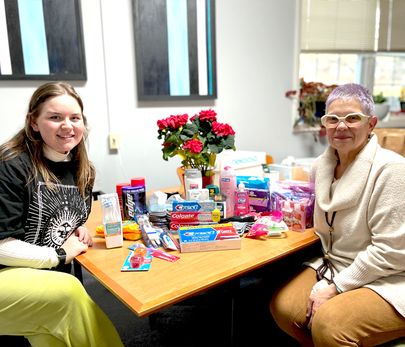 Left: Samantha Posluszny; Right: Dr. Elisabeth Gumnior Left: Samantha Posluszny; Right: Dr. Elisabeth Gumnior Alpha Phi Omega is a service-oriented college Greek organization and the most representative undergraduate, intercollegiate, co-ed non-profit organization in the United States. Aside from a host of regular weekly projects serving local nonprofits (SPCA, Habitat for Humanity, Mercy House, and Bridgewater Retirement Community) the Chi Gamma Chapter of APO at James Madison University chooses a specific local nonprofit as beneficiary of their philanthropic efforts. Under the leadership of its Fall 2021 Philanthropy Chair Samantha Posluszny, APO chose Gemeinschaft Home. Board member and JMU professor Elisabeth Gumnior helped launch the semester-long collection drive for Gemeinschaft Home with a presentation detailing the mission, work, and needs of the organization. At the end of the semester, Samantha delivered multiple large boxes of hygiene items for both the men’s and women’s residences and a check for over $800. APO members collected both material and dollar donations through a variety of fun and informative events on campus. JMU students are often passionate and generous supporters of Gemeinschaft Home. Whether as interns, in the context of Community-Based Learning experiences, or as fundraisers and donors. And Greek life organizations such as APO’s Chi Gamma chapter are leading the way in preparing the next generation of philanthropists. Thank you, APO for your tremendous generosity! Resident Travis Trout has spent over two decades of his life in incarceration, yet his discovery of art while in prison has given him a lifeline of hope for the future. 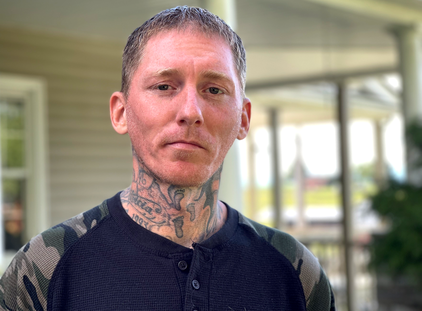 Travis Trout, Resident Travis Trout, Resident Travis Trout, 42, arrived at Gemeinschaft Home in late August and has spent much of his first month in the program experiencing an uncomfortable yet familiar reality—adjusting to life after prison. The leap from day-to-day existence in prison to the chaotic world outside is far more difficult than many people understand. For Trout, someone who has spent about half of his forty-two years behind bars, the process has been a life-long revolving door, with each turn as de-stabilizing as the one before it. Trout’s mother passed away when he was only 13 years old, which had a shattering impact on his development as a young adult. He went to live with his grandparents on Smith Mountain Lake, in southwestern Virginia, where he grew up, but was soon arrested at the age of 14 on a burglary charge. He had broken into a vacated house—damaging a window in the process—an action that precipitated continual interactions with the criminal justice system. At age 17, he was incarcerated for two years in a juvenile facility; so, by early adulthood, Trout already had more than an acquaintance with life as an inmate. He has no violent criminal history, but economic pressure combined with a lack of guidance, led to Trout’s early association with drugs and other low-level crimes, usually involving short sentence terms, followed by community supervision (probation). Between prison stays, he has always tried to live a “normal” life, forming relationships, having children, and trying to get by like everyone else, but he faced significant struggle doing so. He violated the conditions of his probation—such as failing a drug screen—on several occasions which nearly by default landed him back in prison. In fact, over a decade of the time Trout has served was the result of a technical violation of his probation, rather than a new conviction. However, each time he has gone to prison, the de-stabilizing force on his life outside has become more pronounced—the effects of which he especially feels now as a resident in the Gemeinschaft Home program. “The simplest things for most people are the biggest things for me,” Trout explains, pointing out that the highly-structured lifestyle of prison was easier to manage in certain ways. While he lacked basic independence and freedom of movement, he was also granted freedom from the inevitable responsibilities of the outside world—securing a home and stable employment, paying bills, and negotiating a range of daily obstacles that challenge us all. During times of crisis, he has wished to be back in prison, where he argued that he could control his environment and manage expectations of his behavior with more ease. He recalls one such conversation with his probation officer, about 10 years ago, when his uncle had just passed, and he felt his life spinning out of control. He asked her bluntly, “Can you just put me back in jail so I can regroup?” as he planned to purposely fail a drug screen. He felt similarly adrift when he lost both grandparents as well. It was the same pattern he had grown accustomed to over the years. As of August, Trout is again free from incarceration, and he now faces the same obstacles that have always confounded his ability to live beyond the institutional confines of prison. And, while 90 days at Gemeinschaft Home is a start, he has a chance to gain tools to stop the revolving door and to make the permanent transition out of prison. One way he hopes to do so is through his artwork. Ironically, Trout discovered his artistic abilities many years ago, while incarcerated—at first just some basic pencil sketches, but later more developed drawings that he crafted in finer detail. What started as a way to combat boredom quickly became a passion, and with no (or very little) formal training, Trout found a creative outlet that continues to thrive. He also cultivated a proficiency in both designing and applying tattoo art, work that he has continued to pursue both inside and outside of prison. Yet, as an evolving artist, he started to notice how incarceration had changed the way he saw the natural world, and he developed a quick and profound interest in digital photography. “After being locked up so much, when I spent time outside of prison, I started noticing leaves, looking at bugs...seeing things in nature that I never paid attention to,” he says, and he started taking pictures when he was free to roam around and explore. Over the years, he has built a significant collection of drawing and photos, some of which are featured here. Drawing and photography supply a sense of balance in Trout’s life, offering a source of personal growth and a means of creative expression. He hopes to make art an important part of his journey forward to a life that is much too large for the confines of a prison cell.
|
Archives
August 2023
|
